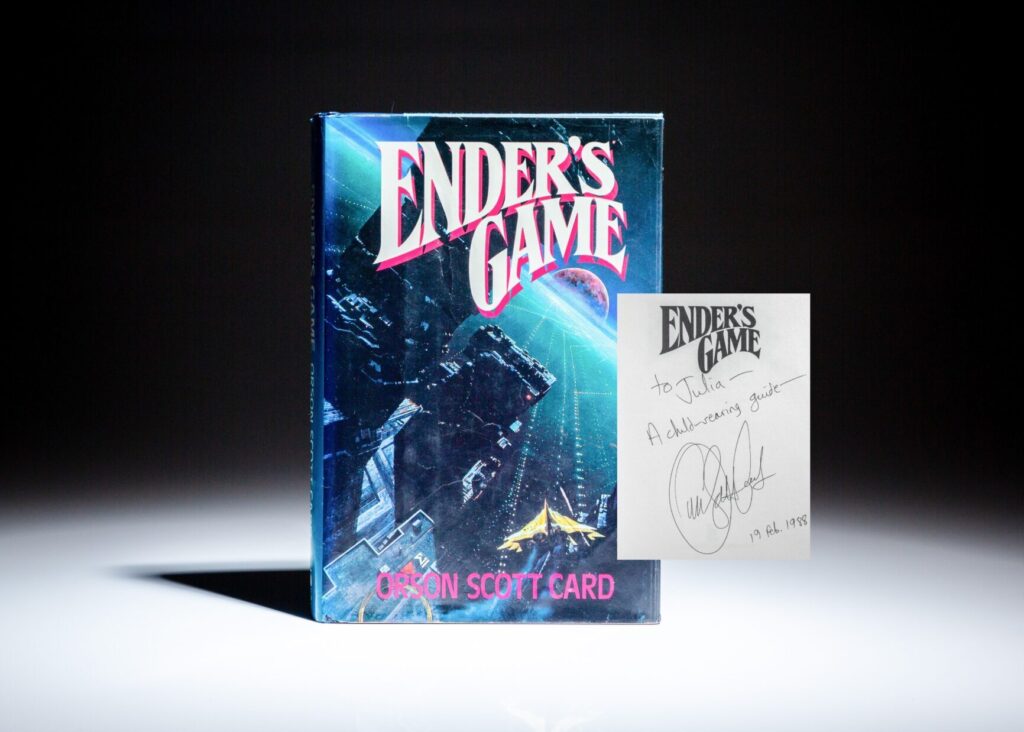Orson Scott Card’s “Ender’s Game” is a seminal work in science fiction literature, captivating readers with its intense storyline, complex characters, and thought-provoking themes. Published in 1985, winning both the Hugo and Nebula Awards and has since become a cornerstone of the genre. The novel’s success led Card to expand the story into a series, exploring deeper philosophical, political, and moral questions through the eyes of its protagonist, Ender Wiggin. Definitely in chase venturing into “Ender’s Game” and its sequels, examining the evolution of Card’s universe and the intricate tapestry of narratives that make this series a lasting contribution to science fiction.
Originated as a short story published in 1977 in Analog Science Fiction and Fact. Card expanded it into a novel to explore the complexities of war, leadership, and the morality of using child soldiers. The novel is set in a future where humanity is at war with an alien species known as the Formics. To prepare for future conflicts, the International Fleet recruits and trains gifted children, grooming them to become military leaders. Andrew “Ender” Wiggin, a young prodigy, is selected for this rigorous training, setting the stage for an exploration of his psychological and moral development.
Themes and Motifs
The novel grapples with themes of isolation, the morality of war, and the manipulation of innocence. Ender’s journey is marked by his internal struggle to reconcile his compassionate nature with the ruthless demands of his training. The Battle School, a space station where children are trained through simulated war games, serves as a microcosm for exploring these themes. The games are not just exercises in strategy but also tests of character and resilience, shaping Ender into a leader who must bear the weight of immense responsibility.
Speaker for the Dead (1986)
“Speaker for the Dead”, the immediate sequel to (Ender’s Game), takes a significant departure from its predecessor. Set thousands of years after the events of *Ender’s Game*, it follows Ender, now known as Andrew Wiggin, as he travels the universe as a “Speaker for the Dead,” someone who tells the true story of the deceased. The novel is set on the planet Lusitania, where humans coexist with a new alien species, the Pequeninos. The story explores themes of cultural understanding, forgiveness, and the consequences of genocide.
In “Speaker for the Dead”, Ender faces the moral ramifications of his actions in *Ender’s Game*. The revelation of the Formics’ true nature and the misunderstandings that led to their destruction forces Ender to seek redemption. The novel’s exploration of xenology—the study of alien species—serves as a backdrop for deeper philosophical questions about humanity’s place in the universe and the ethics of colonization and interaction with other sentient beings.
Xenocide (1991)
Following on to continue story on Lusitania, delving deeper into the conflicts between humans and the Pequeninos. The discovery of a sentient virus, the descolada, which is essential to the Pequeninos’ life cycle but deadly to humans, introduces complex moral dilemmas. The novel intertwines multiple storylines, including the efforts to find a cure for the descolada, the political machinations of the Starways Congress, and Ender’s ongoing quest for understanding and reconciliation.
The title “Xenocide” reflects the fear of another potential genocide, this time against the Pequeninos. The novel examines the ethical implications of exterminating a species for self-preservation and the lengths to which individuals and societies will go to survive. Card’s portrayal of the interspecies interactions and the personal struggles of his characters highlights the intricate balance between survival and ethical responsibility.
Children of the Mind (1996)
Formal summary of the narrative arc begun in “Speaker for the Dead”. The story focuses on the fragmentation of Ender’s personality, resulting in the creation of new, independent beings—Peter and Valentine—who embody different aspects of his character. The novel addresses themes of identity, legacy, and the quest for self-actualization.
As Ender’s physical health deteriorates, his psychological journey reaches its climax. The existence of Peter and Valentine, created from Ender’s thoughts and memories, forces him to confront his past and the different facets of his personality. The novel’s exploration of consciousness and the nature of self adds a metaphysical dimension to the series, questioning what it means to be human and the nature of individuality.
The Formic Wars Prequels
Card also expanded the universe with prequel novels that explore the events leading up to the Formic Wars, providing context for the conflict central to Ender’s Game”.
Co-written with Aaron Johnston, these novels chronicle humanity’s first contact with the Formics and the ensuing struggle to survive. The trilogy explores the initial discovery of the alien threat, the efforts to unite a divided Earth, and the heroic sacrifices made to prevent the annihilation of humanity. These prequels provide a broader understanding of the Formic War’s origins and the societal and technological advancements that set the stage for Ender’s story.
The Burden of Leadership
A recurring theme throughout the series is the burden of leadership. Ender, Bean, and other characters grapple with the responsibilities and moral dilemmas of leading others, often at great personal cost. Card’s portrayal of leadership is nuanced, emphasizing the weight of command and the sacrifices required to protect and guide others.
The Ethical Practice of Warfare
The series extensively explores the ethics of warfare, particularly the use of child soldiers and the justification of genocide. Ender’s internal conflict and the revelation of the Formics’ true nature force readers to confront uncomfortable questions about the morality of war and the manipulation of innocence. The novels challenge the notion of a just war and highlight the tragic consequences of conflict.
Cultural Understanding and Xenology
Card’s exploration of xenology—the study of alien species—serves as a metaphor for cultural understanding and empathy. The interactions between humans, Formics, and Pequeninos underscore the importance of communication, respect, and the willingness to see beyond differences. The series advocates for a more compassionate and inclusive approach to interspecies and intercultural relationships.
The Nature of Identity
The sequels, particularly *Children of the Mind*, delve into the nature of identity and consciousness. Ender’s fragmentation and the creation of Peter and Valentine raise questions about the essence of self and the continuity of personal identity. The novels explore the psychological and philosophical dimensions of individuality, memory, and legacy.
Awards and Recognition
“Ender’s Game” and its sequels have received widespread acclaim and numerous awards. (Ender’s Game) won the Hugo and Nebula Awards, establishing Card as a major figure in science fiction. “Speaker for the Dead” also won both awards, a rare achievement that underscores the series’ literary significance.
Influence on Science Fiction
Card’s series has had a profound impression on the science fiction genre, influencing a generation of writers and readers. The novels’ exploration of complex themes, combined with compelling characters and innovative storytelling, has set a high standard for speculative fiction. The series has inspired adaptations, including a 2013 film and various comic book adaptations, further cementing its place in popular culture.
Educational Use
Enders Game its sequels are frequently used in educational settings to discuss themes of ethics, leadership, and cultural understanding. The novels provide a rich foundation for discussions about morality, the consequences of war, and the complexities of human and alien interactions. The series’ ability to provoke critical thinking and empathy makes it a valuable resource in both literature and social studies curricula.
Orson Scott Card’s *Ender’s Game* and its sequels offer a compelling and thought-provoking exploration of humanity’s potential and its darkest impulses. Through the journey of Ender Wiggin and the expansive
No comments yet.








